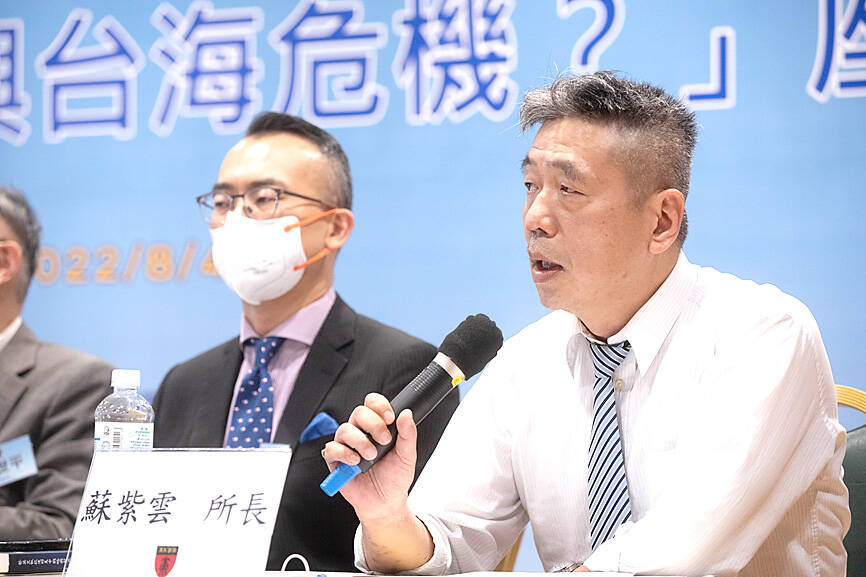Taiwan should strengthen infrastructure, stock up on reserves and step up efforts to encourage Taiwanese to fight against an enemy, legislators and experts said on Tuesday last week.
The comments sought to summarize what the nation should learn from the Russian invasion of Ukraine, which has exceeded 300 days, since Feb. 24 last year.
Institute of National Defense and Security Research fellow Su Tzu-yun (蘇紫雲) said that the war in Ukraine highlighted the importance of being ready for war.

Photo: CNA
Taiwan’s development of an “asymmetrical warfare” doctrine and extending mandatory conscription to one year is a good start to preparation of defense against a possible Chinese invasion, he said.
War games simulated by the Washington-based think tank Center for Strategic and International Studies (CSIS) showed that while Chinese success in landing operations in Taiwan would be extremely low, as it is an island, it would be unable to receive aid like Ukraine, Su said.
The nation needs to inventory supplies, strengthen infrastructure such as underground railways, and repurpose abandoned tunnels for arms stockpiles, Su said.
Taiwan is prone to having its supply routes cut off, and it should acquire all supplies and equipment it needs before any war begins, Democratic Progressive Party Legislator Wang Ting-yu (王定宇) said.
Taiwan should attempt to improve its military hardware, and learn how to use its anti-ship and anti-air missiles better, Wang said, adding that the nation could also seek assistance from the US in bolstering its stockpile of precision munitions, as well as help in increasing missile range and accuracy.
As per the CSIS war games, if Taiwan were without US or Japanese aid at the start of an invasion, it is possible that it would have to hold its own for at least 70 days, Wang said.

A preclearance service to facilitate entry for people traveling to select airports in Japan would be available from Thursday next week to Feb. 25 at Taiwan Taoyuan International Airport, Taoyuan International Airport Corp (TIAC) said on Tuesday. The service was first made available to Taiwanese travelers throughout the winter vacation of 2024 and during the Lunar New Year holiday. In addition to flights to the Japanese cities of Hakodate, Asahikawa, Akita, Sendai, Niigata, Okayama, Takamatsu, Kumamoto and Kagoshima, the service would be available to travelers to Kobe and Oita. The service can be accessed by passengers of 15 flight routes operated by

Chinese spouse and influencer Guan Guan’s (關關) residency permit has been revoked for repeatedly posting pro-China videos that threaten national security, the National Immigration Agency confirmed today. Guan Guan has said many controversial statements in her videos posted to Douyin (抖音), including “the red flag will soon be painted all over Taiwan” and “Taiwan is an inseparable part of China,” and expressing hope for expedited reunification. The agency last year received multiple reports alleging that Guan Guan had advocated for armed reunification. After verifying the reports, the agency last month issued a notice requiring her to appear and explain her actions. Guan

GIVE AND TAKE: Blood demand continues to rise each year, while fewer young donors are available due to the nation’s falling birthrate, a doctor said Blood donors can redeem points earned from donations to obtain limited edition Formosan black bear travel mugs, the Kaohsiung Blood Center said yesterday, as it announced a goal of stocking 20,000 units of blood prior to the Lunar New Year. The last month of the lunar year is National Blood Donation Month, when local centers seek to stockpile blood for use during the Lunar New Year holiday. The blood demand in southern Taiwan — including Tainan and Kaohsiung, as well as Chiayi, Pingtung, Penghu and Taitung counties — is about 2,000 units per day, the center said. The donation campaign aims to boost

The Central Weather Administration (CWA) said a magnitude 4.9 earthquake that struck off the coast of eastern Taiwan yesterday was an independent event and part of a stress-adjustment process. The earthquake occurred at 4:47pm, with its epicenter at sea about 45.4km south of Yilan County Hall at a depth of 5.9km, the CWA said. The quake's intensity, which gauges the actual effects of a temblor, was highest in several townships in Yilan and neighboring Hualien County, where it measured 4 on Taiwan's seven-tier intensity scale, the CWA said. Lin Po-yu (林柏佑), a division chief at the CWA's Seismological Center, told a news conference